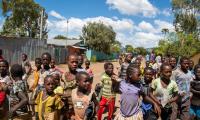Ethiopia’s human rights watchdog is still criticising all parties to the escalating conflict

On 2 November, the Ethiopian government declared a state of emergency. The authorities can now, without judicial oversight, arrest anyone they deem suspicious. This creates fear of detention and retaliation among the country’s civil society organisations, journalists and NGOs.
“Civil society has largely been silent, except for the 24 civil society organisations that issued a public statement calling for peace and cessation of hostilities on 10 September. The Ethiopian Human Rights Commission is now one of only a few institutions continuing dialogue with the government and encouraging respect for human rights amidst the ongoing conflict,” says Ojot Miru Ojulu, head of the Danish Institute for Human Right’s regional work in East Africa.
The authorities are violating detainees’ rights
Based on interviews with some of the thousands of Ethiopians, who have been detained during the state of emergency, the EHRC last week criticised the authorities for violating the rights of detainees.
The EHRC likewise expressed concern on whether the authorities were detaining people based on their ethnicity. According to the human rights commission’s report, the majority of those, who have been detained after the state of emergency was declared, are from Tigray. Most of the detainees told the Commission that they believe their arrest is solely ethnically motivated and that they have still not been informed of the reason for their arrest.
Since 2019 the Danish Institute for Human Rights has, with support from Denmark and a number of other countries, strengthened the capacity of the Ethiopian Human Rights Commission. We have helped pave the way for the Ethiopian Parliament’s 2020 adoption of a law granting the Human Rights Commission full independence from the government.
The critique of the authorities’ detention comes a week after the EHRC, together with the Office of the United Nations High Commissioner for Human Rights (OHCHR), published a crucial report. The report documents that all parties in the conflict between the Ethiopian central government and the local government of Tigray have carried out illegal executions, torture, rape, attacks on refugees and internally displaced, and withheld emergency aid.
“I hope the report provides an opportunity to open a new chapter in this serious political crisis. The conflict is expanding, and we are receiving more and more reports on serious human rights abuses and violations,” says Daniel Bekele, chief commissioner of the Ethiopian Human Rights Commission.
In 2020, the Ethiopian parliament adopted a law granting the Ethiopian human rights commission independence from the government. The new law, which results from the reform process launched by president Abiy Ahmed after taking office in 2018, has had a crucial impact on the human rights commission’s role in Ethiopia today.
“It is historical that the Ethiopian Human Rights Commission has had the opportunity and capacity to conduct thorough and credible investigations of the human rights violations taking place in Ethiopia. We know from other cases of ethnic conflicts that legal action based on credible documentation is vital for the examination and punishment of crimes, in turn paving the way for a future of peaceful coexistence,” says Eva Grambye, Deputy executive director, the Danish Institute for Human Rights.
